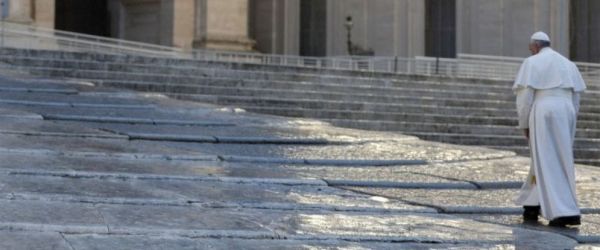Today we celebrate the feast of Saint Stephen, the first martyr. The Book of the Acts of the Apostles tells us about him (cf. 6-7), and today’s liturgy presents him to us in the final moments of his life, when he is captured and stoned (cf. 6: 12; 7: 54-60). In the joyful climate of Christmas, this memory of the first Christian killed for the faith could appear out of place. However, precisely from the perspective of faith, today’s celebration is in tune with the true meaning of Christmas. In Stephen’s martyrdom, in fact, violence is defeated by love, death by life: at the hour of supreme witness, he contemplates the open heavens and grants forgiveness to his persecutors (cf. v. 60).
This young servant of the Gospel, full of the Holy Spirit, knew how to narrate Jesus in words, and above all with his life. Looking to him, we see the fulfilment of Jesus’ promise to His disciples: “When they deliver you over … what you are to say will be given to you in that hour. For it is not you who speak, but the Spirit of your Father speaking through you” (cf. Mt 10: 19-20). In the school of Saint Stephen, who became similar to his Master both in life and in death, we too set our gaze on Jesus, a faithful witness of the Father. We learn that the glory of Heaven, the glory that lasts for eternal life, is not made up of wealth and power, but of love and self-giving.
We need to keep our eyes fixed on Jesus, “the founder and perfecter of our faith” (Heb 12: 2), to be able to give reason to the hope that was given to us (cf. 1 Pt 3: 15), through the challenges and trials that we must face daily. For us Christians, heaven is no longer distant, separate from earth: in Jesus, Heaven descended to earth. And thanks to Him, with the strength of the Holy Spirit, we can assume all that which is human and guide it towards Heaven. So may the first witness be precisely our way of being human, a way of life formed according to Jesus: gentle and courageous, humble and noble, non-violent.
Stephen was a deacon, one of the first seven deacons of the Church (cf. Acts 6: 1-6). He teaches us to proclaim Christ through gestures of fraternity and evangelical charity. His witness, culminating in martyrdom, is a source of inspiration for the renewal of our Christian communities. They are called to become increasingly missionary, all of them tending towards evangelization, determined to reach out to men and women in the existential and geographical peripheries, where there is a greater thirst for hope and salvation. Communities that do not follow the worldly logic, that do not put themselves, their own image, at the centre, but only the glory of God and the good of the people, especially the little ones and the poor.
The feast of this first martyr Stephen calls us to remember all the martyrs of yesterday and today – nowadays they are many! – to feel in communion with them, and to ask them for the grace to live and die with the name of Jesus in our hearts and on our lips. May Mary, Mother of the Redeemer, help us to live this Christmas time by fixing our gaze on Jesus, so that we may become more like Him every day.
[Pope Francis, Angelus 26 December 2019]












